人教版高一英语必修4 Unit2 Working the land reading 课件(共61张PPT)
文档属性
| 名称 | 人教版高一英语必修4 Unit2 Working the land reading 课件(共61张PPT) |
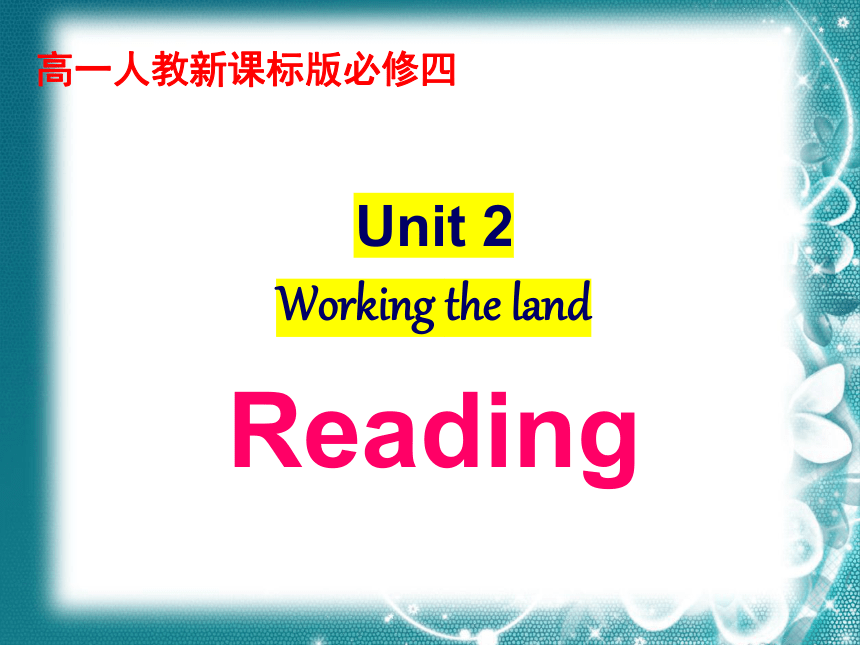
|
|
| 格式 | ppt | ||
| 文件大小 | 2.2MB | ||
| 资源类型 | 教案 | ||
| 版本资源 | 人教版(新课程标准) | ||
| 科目 | 英语 | ||
| 更新时间 | 2020-10-01 00:00:00 | ||
图片预览

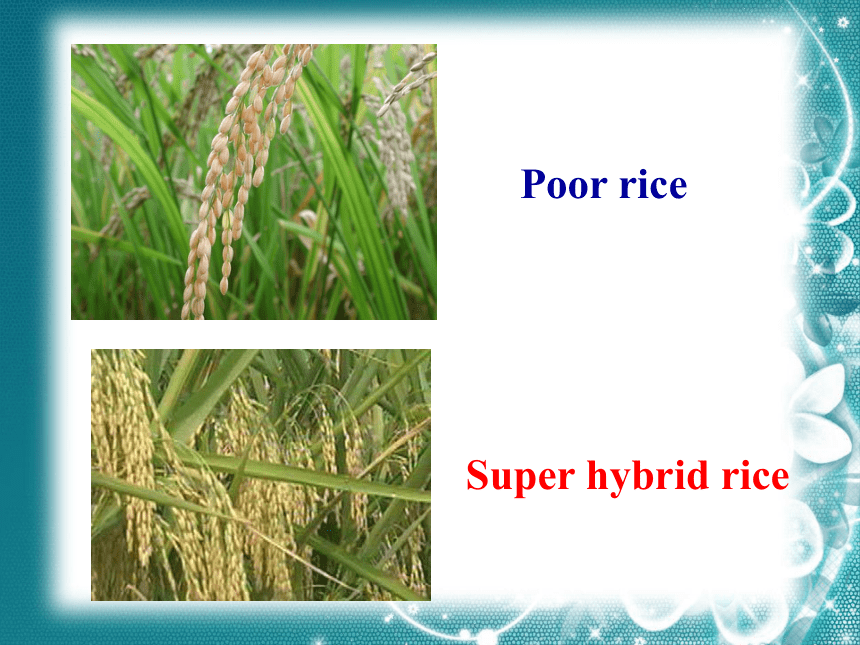
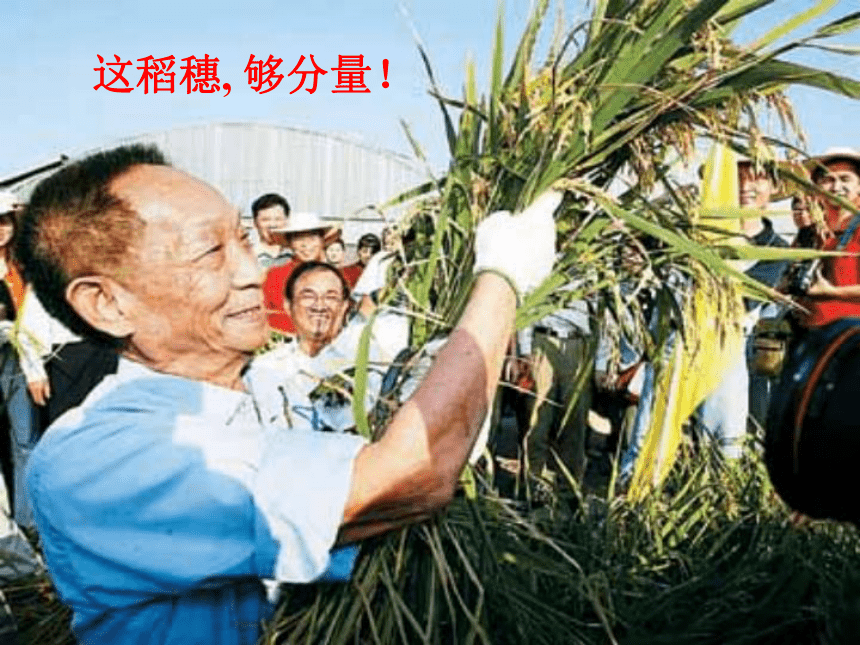
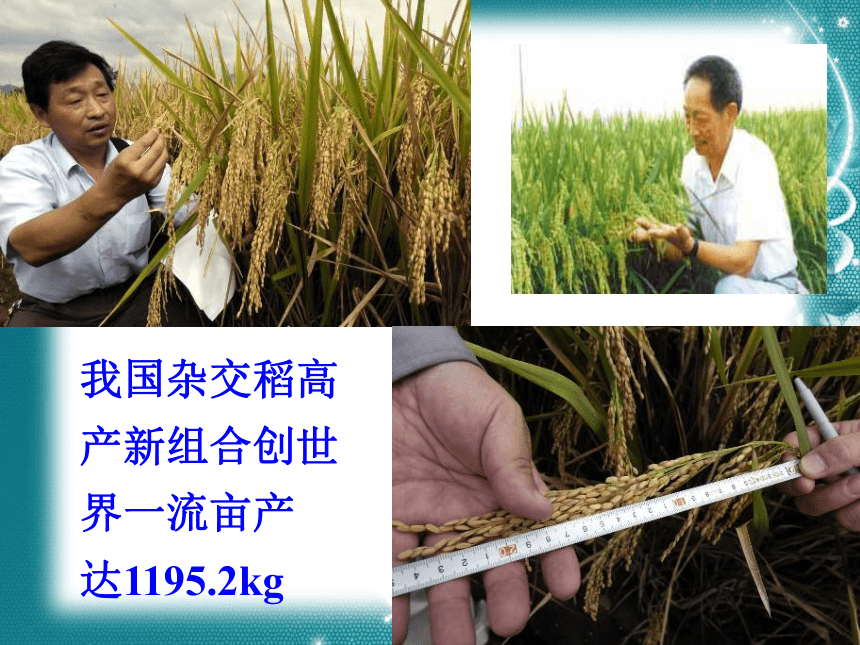
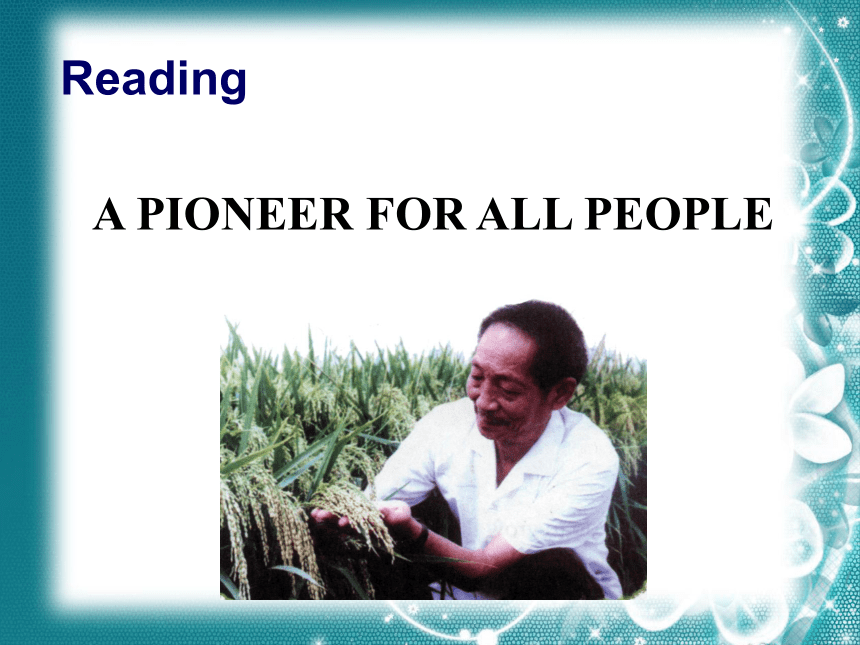
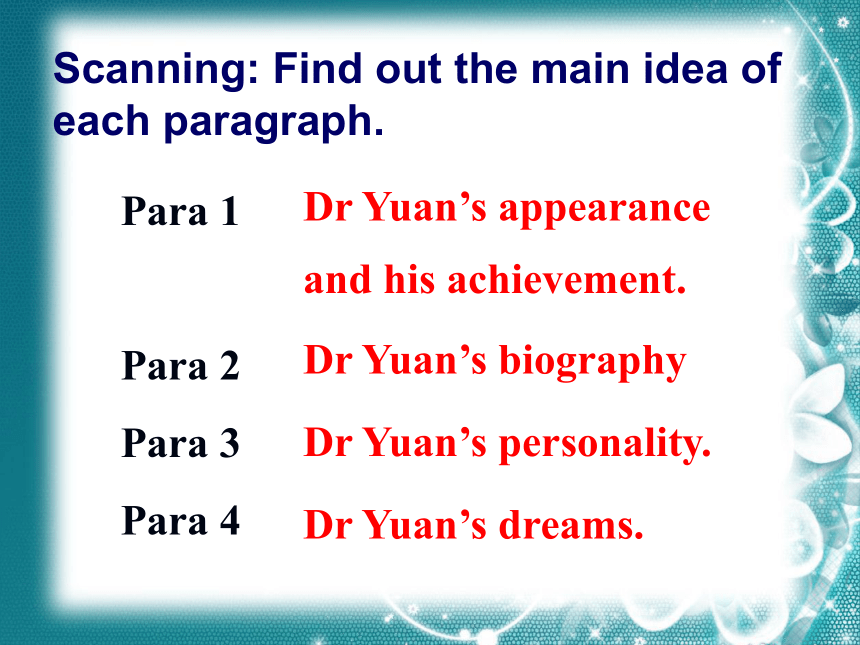
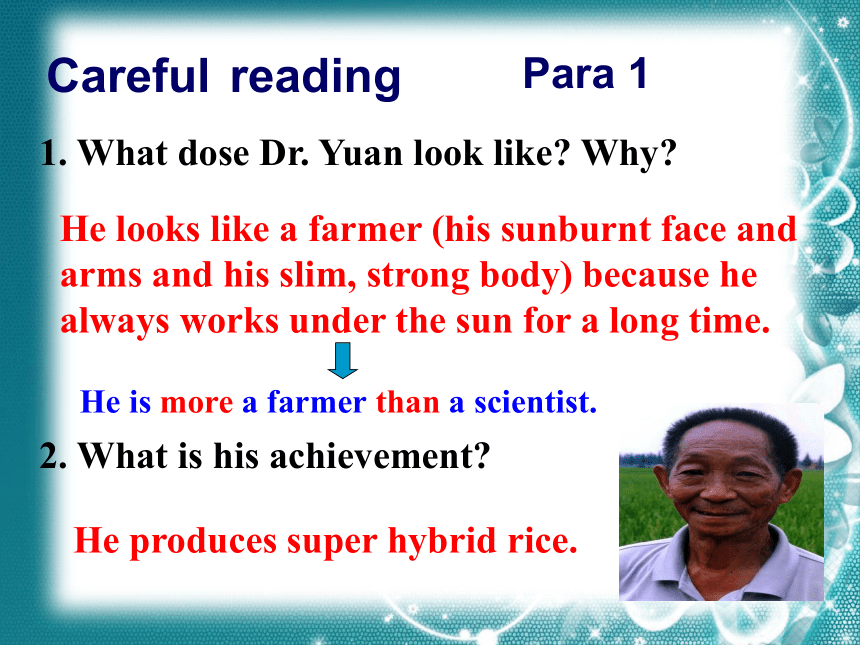
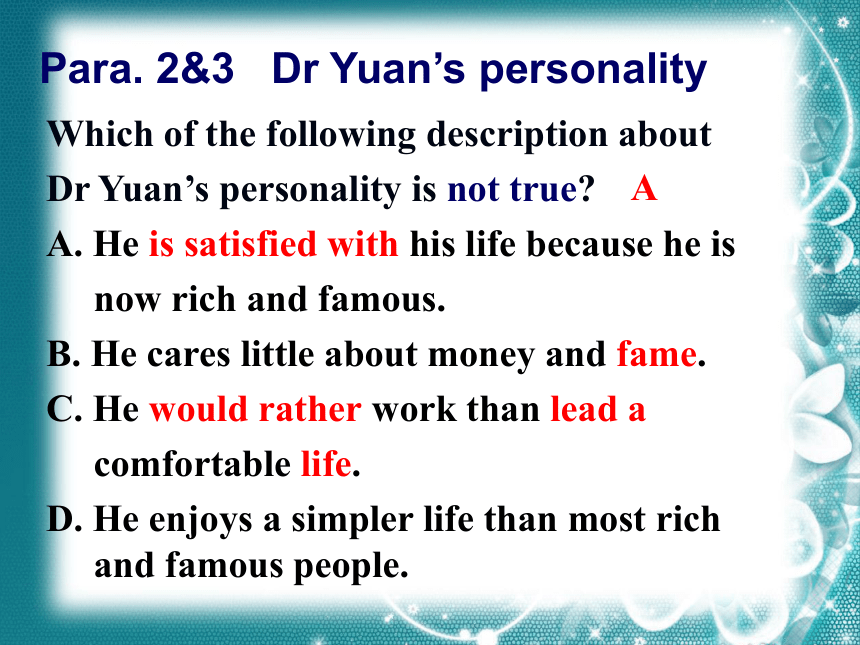
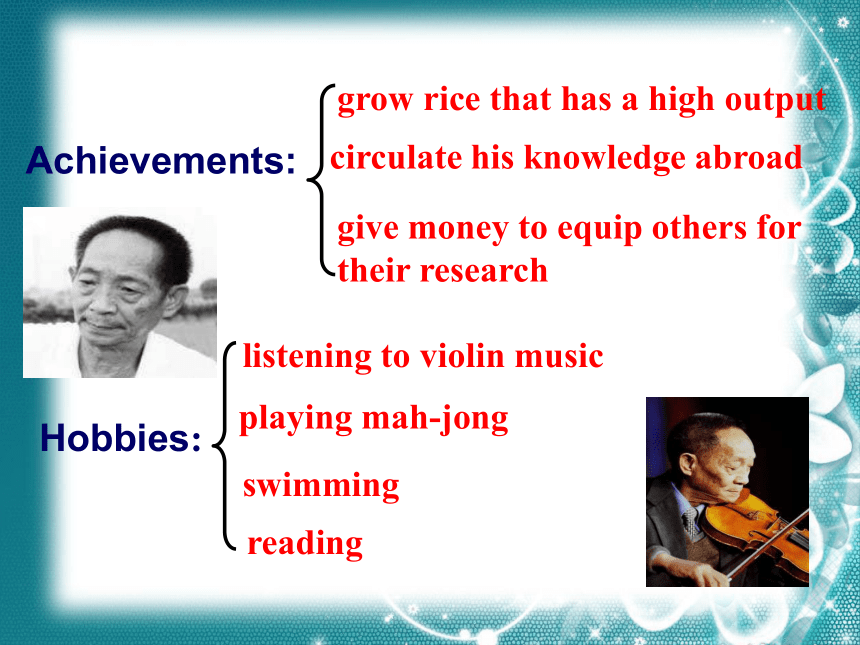
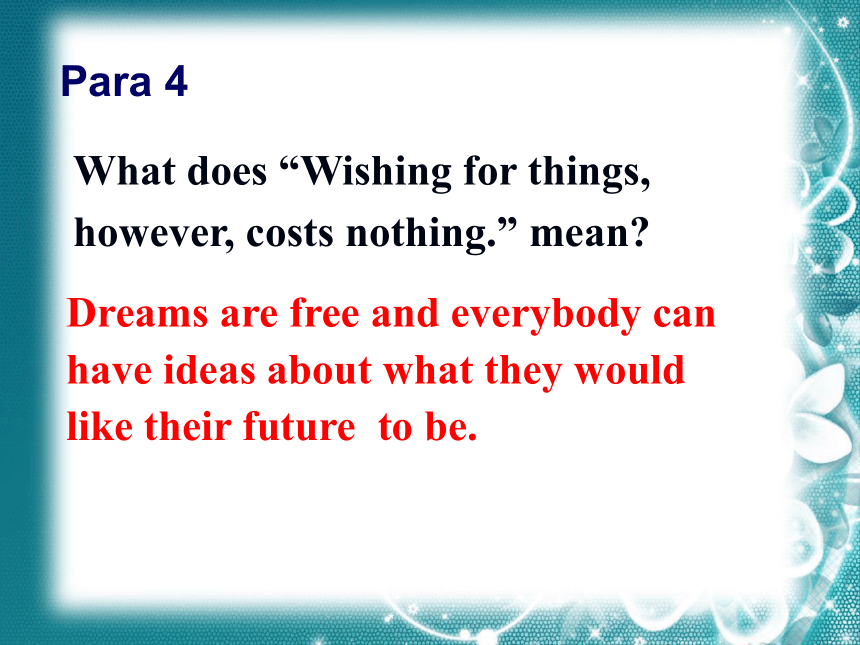
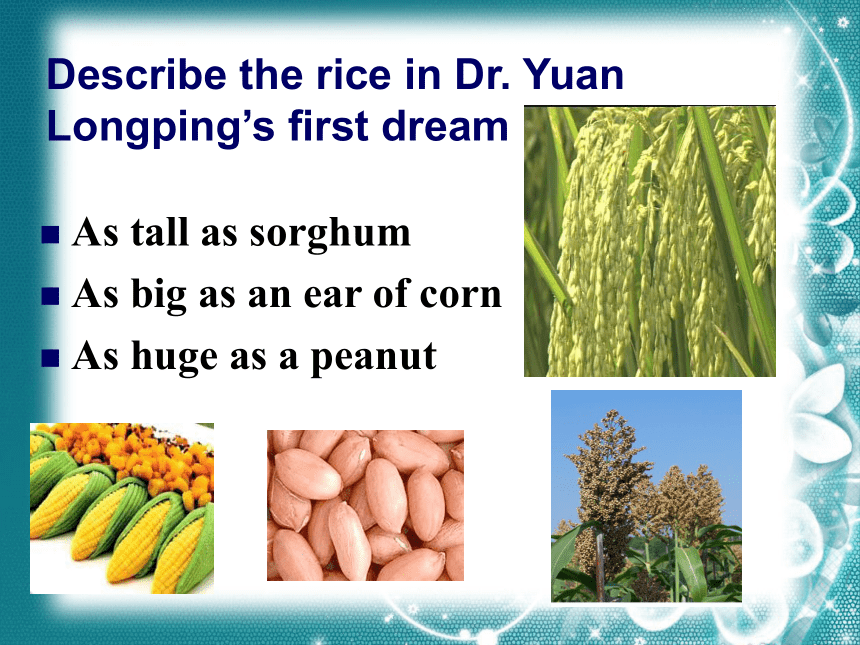
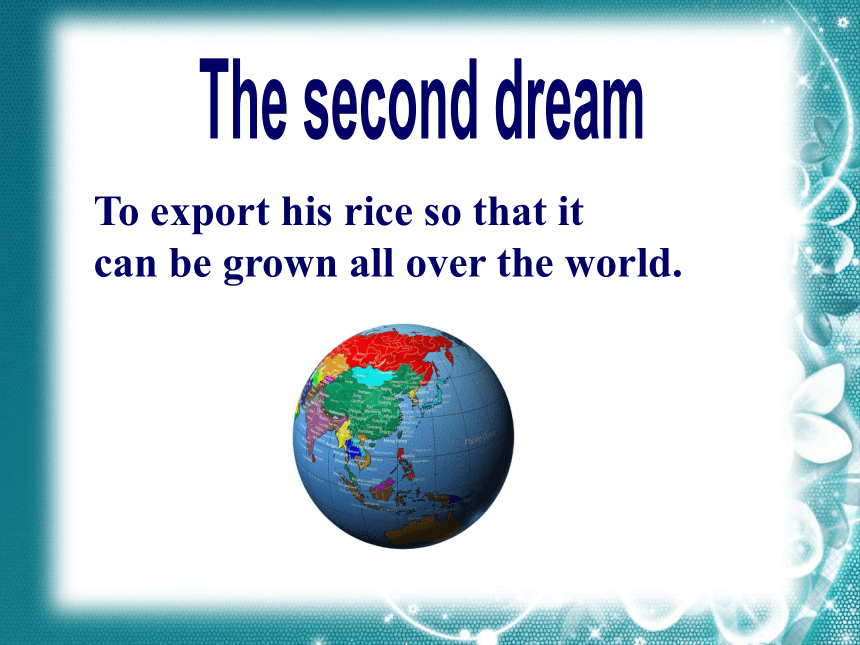
文档简介
高一人教新课标版必修四
Poor rice
Super hybrid rice
这稻穗, 够分量!
我国杂交稻高产新组合创世界一流亩产 达1195.2kg
A PIONEER FOR ALL PEOPLE
Reading
Scanning: Find out the main idea of
each paragraph.
Dr Yuan’s appearance
and his achievement.
Dr Yuan’s biography
Dr Yuan’s personality.
Dr Yuan’s dreams.
Para 1
Para 2
Para 3
Para 4
1. What dose Dr. Yuan look like? Why?
2. What is his achievement?
Para 1
He looks like a farmer (his sunburnt face and
arms and his slim, strong body) because he
always works under the sun for a long time.
He produces super hybrid rice.
Careful reading
He is more a farmer than a scientist.
Which of the following description about
Dr Yuan’s personality is not true?
A. He is satisfied with his life because he is
now rich and famous.
B. He cares little about money and fame.
C. He would rather work than lead a
comfortable life.
D. He enjoys a simpler life than most rich
and famous people.
Para. 2&3 Dr Yuan’s personality
A
Achievements:
Hobbies:
grow rice that has a high output
circulate his knowledge abroad
give money to equip others for
their research
listening to violin music
playing mah-jong
swimming
reading
Para 4
What does “Wishing for things,
however, costs nothing.” mean?
Dreams are free and everybody can
have ideas about what they would
like their future to be.
Describe the rice in Dr. Yuan
Longping’s first dream
As tall as sorghum
As big as an ear of corn
As huge as a peanut
To export his rice so that it
can be grown all over the world.
Paraphrase these sentences.
1. As a young man, he saw the great need
for increasing the rice output.
Even when he was a young man, he knew how important it was to increase the output og rice..
2. At that time, hunger was a disturbing
problem in many parts of the countryside.
During his early years, much of the
countryside was troubled by hunger.
3. Using his hybrid rice, farmers are
producing harvests twice as large as
before.
As they use his hybrid rice, farmers are
producing twice as much rice as before.
4. Spending money on himself or leading a
comfortable life also means very little to
him.
5. Just dreaming for things, however, costs
nothing.
It does not cost anything to dream for
something.
He is not interested in buying things for
himself or in having a comfortable life.
Answer these questions.
1. Why did Yuan Longping want to
increase the rice output when he
was young?
Because at that time, hunger was a serious
problem in many parts of the countryside.
He saw many people suffer from hunger
when he was young.
I think he is more of a scientist, although
he works in the fields like a farmer. His
main purpose is not to make a profit for
himself but to study agriculture and use
that knowledge to improve farming for
farmers everywhere. I do not think he is
a businessman, because his goal is not to
make money.
2. Is Dr Yuan more of a scientist or
more of a farmer? Do you think he is
a businessman? Give your reasons.
3. How would you describe Dr Yuan’s
personality? Use three or four adjectives.
Dr Yuan is a simple, academic man
who is more interested in helping others
than being famous.
4. Dr Yuan thinks that a person with too
much money has more rather than fewer
troubles. Do you agree or disagree? Why?
I mostly agree. I think being rich can
cause a lot of problems, but it really
depends on the life and attitude of the
person who is rich. People who are rich
certainly have different problems from
people who are not.
How to solve hunger?
making good use of the waste land
developing the technology to…
inventing a new kind of food…
improving the quality of the soil
preventing the pests from eating our crops
1. work
vt. 耕种(土地); 使工作; 开动; 创造(奇迹);
经营(工厂、农场等)
vi. 工作; (机器等)开动; (办法、计划等)行得通
work the land=grow crops on it 耕耘土地
He works a big farm. 他经营着一个大的农场。
They are working the land together.
I don’t think that your suggestion will work.
2. …whom he has struggled for the past 50
decades.
struggle v. “斗争; 拼搏; 努力”
e.g. He has struggled with sickness for a
few months. 数月来他一直在与疾病作斗争。
They were poor and had to struggle for
a living. 他们很穷, 必须为生活而努力。
He struggled with the thief.
他同小偷进行了搏斗。
He struggled to control his temper.?
他努力控制住自己的脾气。
【拓展】
1) struggle 还可用作名词, 表示“奋斗; 努力”等。
e.g. In 1862 the American slaves won their
struggle for freedom. 1862年美国黑奴赢得了
为自由而进行的斗争的胜利。
2)常见搭配:
struggle for 为……而斗争
struggle against 向……做斗争; 同……搏斗
struggle on 拼命活下去; 继续努力
struggle to one’s feet 挣扎着站起来
根据句意, 用适当的介词或副词填空。
They had to struggle ____ their lives _______
weather and wild animals in that area.
(2) In order to protect the environment, we
should struggle _______ all kinds of pollution.
(3) He agreed to struggle ____, though he was
hoping to retire.
(4) After a few minutes, the young man
struggled ___ his feet, glaring at the enemy.
for
against
against
on
to
battle, fight, war, struggle, campaign作名词
时的用法区别
▲battle 战役(指大规模会战), 战争。如:
an important battle in the Pacific campaign
They died in battle.
▲fight 意为“打架, 战斗力”, 企图通过打击
或用武力伤害敌人或从敌人那里夺权。如:
The two boys had a fight.
There’s no fight left in him.
▲war “战争, 大战”, 指在国家、民族或派别
之间进行的公开的、使用武力的、常持续一段
时间的冲突的状态; “斗争”, 为与某些被认为
是有害之物作战或使其结束而作的齐心协力
的努力或斗争。如:
the war against acid rain
The two countries were at war for two years.
▲struggle意为“奋斗, 挣扎”, 尤指在困境中
的抗争。如:
She spoke of her struggles with shyness.
Police said there were no signs of a struggle.
▲campaign意为“战役”, 在一场战争中,
为达到一个宏大的目的而采取的一系列
的军事举措; 还可指“(政治或商业性)活动,
竞选运动”。如:
a campaign to stop people smoking
That politician won the presidential
election campaign and became the
President.
3. This special strain of rice makes it possible
to produce one-third more of the crop in the
same fields.
这种特殊的稻种使得同样的田地多收获三分
之一的产量。
it 在句中作形式宾语, 真正的宾语为 to
produce…, 结构为: 动词(make, feel, think,
regard…)+it +adj+ to do.
e.g. We think it important to learn English well.
4. Born in a poor farmer’s family in 1931, Dr.
Yuan graduate from Southwest Agriculture
College in 1953.
袁博士1931年出身于一个贫苦农民的家庭,
1953年毕业于西南农学院。
graduate n. 毕业生
undergraduate 本科毕业生
post-graduate 硕士毕业生, 研究生
graduate vi. 常跟介词from, 表示“毕业于”
graduation n. 毕业
e.g. After his graduation from college, he went
to work as an engineer in a company.
=After he graduated from college, he went to
work as an engineer in a company.
bachelor’s degree 学士学位
master’s degree 硕士学位
doctor’s degree 博士学位
5. Dr. Yuan searched for a way to increase rice
harvests without expanding the area of fields.
袁博士寻求一种在不扩大种植面积的情况下
提高水稻产量的方法。
1)search 强调搜查, 一般表示目标明确范围较小。
search sb. 搜身; search some place. 搜查某地
search for 强调寻找, 一般表示范围较大。
search for sb 寻找某人
The police searched the woods for the lost child.
Scientists are still searching for a cure to the
common cold.
search/search for/in search of
The officer went up _____________
the murder.
The thieves are _________________
the hidden treasure in the museum.
Birds fly to the south ______________
the winter sunshine.
to search
searching for
in search of
2) expand v. 使变大; 伸展 如:
The population of China expanded
quickly in the 1960s.
You can expand your knowledge by
reading more books.
expansion n. expandable adj.
6. circulate v. 循环, 交流 circulation n.
e.g. Rumors circulated quickly.
The blood circulates around the body.
7. Thanks to his research, the UN has
more tools in the battle to rid the
world of hunger.
1) thanks to: 幸亏/由于
Thanks to your help, I passed the exam.
because of, thanks to, as a result of
表示“由于”时的用法区别:
▲because of 意为“因为, 由于”, 普通用语,
比其他短语更口语化; 构成的短语在句子中
通常作状语, 后面可接名词、代词、分词或
what引导的名词性从句等。如:
Johnson is likely to miss the match because
of his back injury.
Because of my bad leg, I couldn’t walk so
fast as the others.
Because of his wife’s being there, I said
nothing about it.
▲thanks to “由于或因为某人(某事)”,
通常用于好的方面, 译为“多亏”, 但
有时作反语; 引导的介词短语可置于
句首或句末。如:
The play succeeded thanks to fine acting
by all the actors and actresses. ??
Thanks to your help, we were successful.
Thanks to the bad weather, the match
had been cancelled.
▲as a result “因此,结果”,常用在有上
下文(表原因)的情况下。?as a result of …
“由于……的结果”, 可置于句首或句末。
e.g. He had some bad fish. As a result,
he didn’t feel well this morning.
As a result of the flood, thousands of
people lost their homes.
2) rid … of 意为“(使)摆脱, (使)除掉”,
rid (rid/ridded, rid, ridding) v. 如:
She is trying to rid herself of a dependence
on drugs.
You should rid yourself of the bad habits.
= You should get rid of the bad habits.
[拓展] rid 还可用作形容词, 构成get/be rid of,
意为“丢弃, 扔掉; 摆脱, 除去”。如:
Let’s get rid of this old furniture.
We will be glad to get rid of him.
8. Using his hybrid rice farmers are producing
harvests twice as large as before.
用他的杂交水稻种子, 农民们种出比以前多
一倍的粮食。
倍数词 (twice/half/three times/a quarter etc.)
+as + 形容词原级 +as …表示“是……的多少
倍”。
e.g. The number of the students in our school
is ______________________ in their school.
我们学校学生的数量是他们学校的两倍。
twice as large as that
英语中的倍数表达法共有三种形式:
(1) 倍数 + 形容词/副词的比较级 + than...
(2) 倍数 + as +形容词/副词的原级 + as...
(3) 倍数 + the + 名词+ of...
This building is five times higher than that one.
这座楼比那座楼高出五倍。
This building is five times as high as that one.
这座楼是那座楼的五倍高。
This building is five times the height of
that one. 这座楼是那座楼的五倍高。
The new building is four times the size
of the old one.
It is reported that the United States
uses ___ energy as the whole of Europe.
A. as twice?? ?? B. twice much??
C. twice much as? ?? D. twice as much
D
1. John is the tallest boy in the class, _____
according to himself. (2005安徽卷)
five foot eight as tall as ????
B. as tall as five foot eight
C.? as five foot eight as???????
D. as tall five foot eight as
高考链接
B
2. (NMET 2001, 28) It is generally believed
that teaching is ______ it is a science.
an art much as
much an art as
C. as an art much as
D. as much an art as
D
Click here to learn more about the
use of as.
9. Dr Yuan is quite satisfied with his life.
be satisfied with: 对……感到满意
One shouldn’t be satisfied with only a
little success. 一个人不应该只因一点小
成就而感到满足。
satisfy: v. 使……满意,赔偿
I had to explain the reasons to satisfy
his curiosity.?
我只好解释原因来满足他的好奇心。
10. He would much rather keep time for
his hobbies.
would rather: 宁可; 宁愿
would rather do sth.
They would rather go fishing than stay at
home.? 他们宁愿去钓鱼, 也不愿待在家里。
I would rather fail than cheat in the
examination.?
我宁愿考不及格, 也不愿意考试作弊。
[用法1]: would rather…than… 宁愿……
而不……, 与其……不如……
I would rather watch TV at home than
go to the cinema.
[用法2]: would rather have done sth.
表示主语要做某事,而结果却事与愿违。
I’d rather have left a note on her desk.
我本想留张字条在她的书桌上。
(事实上没有)
[用法3]: would … rather than…
=would rather…than…
Facing the enemies, our soldiers would
die rather than surrender.
面对敌人, 我们的战士宁死不屈。
Rather than refuse to help you, I
would borrow money from my friends.
我宁可向朋友借钱, 也不愿拒绝帮助你。
[用法4]: would rather后面也可跟从句
表示主语宁愿某人做某事。这时, 从句
谓语应用虚拟语气, 即用一般过去时表示
现在或将来要做的事; 用过去完成时
表示已经做过的事或过去要做的事。
I’d rather you hadn’t told him the news
that day.
[高考链接]
---Shall we go skating or stay at home?
---Which ____ do yourself ? (05 全国)
do you rather B. would you rather
C. will you rather D. should you rather
答案B would rather do sth. 更喜欢做…
12. Indeed, he believes that a person with too
much money has more, rather than fewer
troubles.
1) too much 与much too的区别
too much通常位于动词之后,修饰动词,too
做much的状语,后面也可接名词。
She does talk too much, doesn’t she?
He has too much work to do.
而much too则常用在形容词或副词之前修饰
形容词或副词。
The dress is much too long for me.
这衣服我穿太长了。
I got into the taxi and drove much too fast.
我上了出租车, 并开得飞快。
2) rather than 而不是
Mary, rather than her roommates, is going
to Beijing.
要去北京的是玛丽, 而不是她的室友们。
注意: rather than 连接两个名词或代词作主语时,谓语动词应与rather than 前面的名词或代词在人称和数上保持一致。
She ran rather than walked. 她跑着而不是走着。
He is a student rather than a worker. 他是学生, 不是工人。?
They lost some books rather than money. 他们丢了一些书, 而不是钱。
I decided to write rather than (to) telephone. 我决定写信而不打电话。
Rather than ________ on a crowded
bus, he always prefers ________ a
bicycle.
A. ride; ride B. riding; ride
C. ride; to ride D. to ride; riding
高考链接
C
12. He therefore gives millions of yuan to
equip others for their research in agriculture.
1) therefore: 因此; 所以; 因而
We have a growing population and therefore
we need more food.?
我们的人口在增长, 因此我们需要更多的食物。
2) equip v. 装备; 配备
常用搭配 equip sb / sth with sth。如:
The room is equipped with air conditioning.
这个房间装有空调设备。
They were not equipped to deal with the
situation.
他们没有准备好应付这种局面。
We equip our children with a good education.
我们使孩子们受到良好的教育。
We want our son to have an education that
will equip him for later life.
13. …to export his rice so that it can be
grown around the globe.
export为动词, 意为“输出, 出口; 传播, 输送”。
e.g. Africa is exporting beef to Europe.
Italian food has been exported all over the
world.
The influence of American music has been
exported to many parts of the world.
[拓展] export还可以用作名词, 作不可数名词时,
意为“出口”; 作可数名词时, 意为“出口商品”,
常用作复数。如:
The export of electronic equipment has risen
sharply.
What are the chief exports of your country?
用export的适当形式填空:
In 1990, the company ________ many goods to
the African countries.
Corn is one of American chief _________.
exported
exports
Homework
1. Finish the exercises in “Learning about
Language”.
2. Retell the text in about 150 words. Notes:
a. Use the first person to retell the story.
b. Try to use the proper conjunctions.
c. Refer to the chart while retelling.
谢 谢!
放映结束 感谢各位观看!
让我们共同进步
Poor rice
Super hybrid rice
这稻穗, 够分量!
我国杂交稻高产新组合创世界一流亩产 达1195.2kg
A PIONEER FOR ALL PEOPLE
Reading
Scanning: Find out the main idea of
each paragraph.
Dr Yuan’s appearance
and his achievement.
Dr Yuan’s biography
Dr Yuan’s personality.
Dr Yuan’s dreams.
Para 1
Para 2
Para 3
Para 4
1. What dose Dr. Yuan look like? Why?
2. What is his achievement?
Para 1
He looks like a farmer (his sunburnt face and
arms and his slim, strong body) because he
always works under the sun for a long time.
He produces super hybrid rice.
Careful reading
He is more a farmer than a scientist.
Which of the following description about
Dr Yuan’s personality is not true?
A. He is satisfied with his life because he is
now rich and famous.
B. He cares little about money and fame.
C. He would rather work than lead a
comfortable life.
D. He enjoys a simpler life than most rich
and famous people.
Para. 2&3 Dr Yuan’s personality
A
Achievements:
Hobbies:
grow rice that has a high output
circulate his knowledge abroad
give money to equip others for
their research
listening to violin music
playing mah-jong
swimming
reading
Para 4
What does “Wishing for things,
however, costs nothing.” mean?
Dreams are free and everybody can
have ideas about what they would
like their future to be.
Describe the rice in Dr. Yuan
Longping’s first dream
As tall as sorghum
As big as an ear of corn
As huge as a peanut
To export his rice so that it
can be grown all over the world.
Paraphrase these sentences.
1. As a young man, he saw the great need
for increasing the rice output.
Even when he was a young man, he knew how important it was to increase the output og rice..
2. At that time, hunger was a disturbing
problem in many parts of the countryside.
During his early years, much of the
countryside was troubled by hunger.
3. Using his hybrid rice, farmers are
producing harvests twice as large as
before.
As they use his hybrid rice, farmers are
producing twice as much rice as before.
4. Spending money on himself or leading a
comfortable life also means very little to
him.
5. Just dreaming for things, however, costs
nothing.
It does not cost anything to dream for
something.
He is not interested in buying things for
himself or in having a comfortable life.
Answer these questions.
1. Why did Yuan Longping want to
increase the rice output when he
was young?
Because at that time, hunger was a serious
problem in many parts of the countryside.
He saw many people suffer from hunger
when he was young.
I think he is more of a scientist, although
he works in the fields like a farmer. His
main purpose is not to make a profit for
himself but to study agriculture and use
that knowledge to improve farming for
farmers everywhere. I do not think he is
a businessman, because his goal is not to
make money.
2. Is Dr Yuan more of a scientist or
more of a farmer? Do you think he is
a businessman? Give your reasons.
3. How would you describe Dr Yuan’s
personality? Use three or four adjectives.
Dr Yuan is a simple, academic man
who is more interested in helping others
than being famous.
4. Dr Yuan thinks that a person with too
much money has more rather than fewer
troubles. Do you agree or disagree? Why?
I mostly agree. I think being rich can
cause a lot of problems, but it really
depends on the life and attitude of the
person who is rich. People who are rich
certainly have different problems from
people who are not.
How to solve hunger?
making good use of the waste land
developing the technology to…
inventing a new kind of food…
improving the quality of the soil
preventing the pests from eating our crops
1. work
vt. 耕种(土地); 使工作; 开动; 创造(奇迹);
经营(工厂、农场等)
vi. 工作; (机器等)开动; (办法、计划等)行得通
work the land=grow crops on it 耕耘土地
He works a big farm. 他经营着一个大的农场。
They are working the land together.
I don’t think that your suggestion will work.
2. …whom he has struggled for the past 50
decades.
struggle v. “斗争; 拼搏; 努力”
e.g. He has struggled with sickness for a
few months. 数月来他一直在与疾病作斗争。
They were poor and had to struggle for
a living. 他们很穷, 必须为生活而努力。
He struggled with the thief.
他同小偷进行了搏斗。
He struggled to control his temper.?
他努力控制住自己的脾气。
【拓展】
1) struggle 还可用作名词, 表示“奋斗; 努力”等。
e.g. In 1862 the American slaves won their
struggle for freedom. 1862年美国黑奴赢得了
为自由而进行的斗争的胜利。
2)常见搭配:
struggle for 为……而斗争
struggle against 向……做斗争; 同……搏斗
struggle on 拼命活下去; 继续努力
struggle to one’s feet 挣扎着站起来
根据句意, 用适当的介词或副词填空。
They had to struggle ____ their lives _______
weather and wild animals in that area.
(2) In order to protect the environment, we
should struggle _______ all kinds of pollution.
(3) He agreed to struggle ____, though he was
hoping to retire.
(4) After a few minutes, the young man
struggled ___ his feet, glaring at the enemy.
for
against
against
on
to
battle, fight, war, struggle, campaign作名词
时的用法区别
▲battle 战役(指大规模会战), 战争。如:
an important battle in the Pacific campaign
They died in battle.
▲fight 意为“打架, 战斗力”, 企图通过打击
或用武力伤害敌人或从敌人那里夺权。如:
The two boys had a fight.
There’s no fight left in him.
▲war “战争, 大战”, 指在国家、民族或派别
之间进行的公开的、使用武力的、常持续一段
时间的冲突的状态; “斗争”, 为与某些被认为
是有害之物作战或使其结束而作的齐心协力
的努力或斗争。如:
the war against acid rain
The two countries were at war for two years.
▲struggle意为“奋斗, 挣扎”, 尤指在困境中
的抗争。如:
She spoke of her struggles with shyness.
Police said there were no signs of a struggle.
▲campaign意为“战役”, 在一场战争中,
为达到一个宏大的目的而采取的一系列
的军事举措; 还可指“(政治或商业性)活动,
竞选运动”。如:
a campaign to stop people smoking
That politician won the presidential
election campaign and became the
President.
3. This special strain of rice makes it possible
to produce one-third more of the crop in the
same fields.
这种特殊的稻种使得同样的田地多收获三分
之一的产量。
it 在句中作形式宾语, 真正的宾语为 to
produce…, 结构为: 动词(make, feel, think,
regard…)+it +adj+ to do.
e.g. We think it important to learn English well.
4. Born in a poor farmer’s family in 1931, Dr.
Yuan graduate from Southwest Agriculture
College in 1953.
袁博士1931年出身于一个贫苦农民的家庭,
1953年毕业于西南农学院。
graduate n. 毕业生
undergraduate 本科毕业生
post-graduate 硕士毕业生, 研究生
graduate vi. 常跟介词from, 表示“毕业于”
graduation n. 毕业
e.g. After his graduation from college, he went
to work as an engineer in a company.
=After he graduated from college, he went to
work as an engineer in a company.
bachelor’s degree 学士学位
master’s degree 硕士学位
doctor’s degree 博士学位
5. Dr. Yuan searched for a way to increase rice
harvests without expanding the area of fields.
袁博士寻求一种在不扩大种植面积的情况下
提高水稻产量的方法。
1)search 强调搜查, 一般表示目标明确范围较小。
search sb. 搜身; search some place. 搜查某地
search for 强调寻找, 一般表示范围较大。
search for sb 寻找某人
The police searched the woods for the lost child.
Scientists are still searching for a cure to the
common cold.
search/search for/in search of
The officer went up _____________
the murder.
The thieves are _________________
the hidden treasure in the museum.
Birds fly to the south ______________
the winter sunshine.
to search
searching for
in search of
2) expand v. 使变大; 伸展 如:
The population of China expanded
quickly in the 1960s.
You can expand your knowledge by
reading more books.
expansion n. expandable adj.
6. circulate v. 循环, 交流 circulation n.
e.g. Rumors circulated quickly.
The blood circulates around the body.
7. Thanks to his research, the UN has
more tools in the battle to rid the
world of hunger.
1) thanks to: 幸亏/由于
Thanks to your help, I passed the exam.
because of, thanks to, as a result of
表示“由于”时的用法区别:
▲because of 意为“因为, 由于”, 普通用语,
比其他短语更口语化; 构成的短语在句子中
通常作状语, 后面可接名词、代词、分词或
what引导的名词性从句等。如:
Johnson is likely to miss the match because
of his back injury.
Because of my bad leg, I couldn’t walk so
fast as the others.
Because of his wife’s being there, I said
nothing about it.
▲thanks to “由于或因为某人(某事)”,
通常用于好的方面, 译为“多亏”, 但
有时作反语; 引导的介词短语可置于
句首或句末。如:
The play succeeded thanks to fine acting
by all the actors and actresses. ??
Thanks to your help, we were successful.
Thanks to the bad weather, the match
had been cancelled.
▲as a result “因此,结果”,常用在有上
下文(表原因)的情况下。?as a result of …
“由于……的结果”, 可置于句首或句末。
e.g. He had some bad fish. As a result,
he didn’t feel well this morning.
As a result of the flood, thousands of
people lost their homes.
2) rid … of 意为“(使)摆脱, (使)除掉”,
rid (rid/ridded, rid, ridding) v. 如:
She is trying to rid herself of a dependence
on drugs.
You should rid yourself of the bad habits.
= You should get rid of the bad habits.
[拓展] rid 还可用作形容词, 构成get/be rid of,
意为“丢弃, 扔掉; 摆脱, 除去”。如:
Let’s get rid of this old furniture.
We will be glad to get rid of him.
8. Using his hybrid rice farmers are producing
harvests twice as large as before.
用他的杂交水稻种子, 农民们种出比以前多
一倍的粮食。
倍数词 (twice/half/three times/a quarter etc.)
+as + 形容词原级 +as …表示“是……的多少
倍”。
e.g. The number of the students in our school
is ______________________ in their school.
我们学校学生的数量是他们学校的两倍。
twice as large as that
英语中的倍数表达法共有三种形式:
(1) 倍数 + 形容词/副词的比较级 + than...
(2) 倍数 + as +形容词/副词的原级 + as...
(3) 倍数 + the + 名词+ of...
This building is five times higher than that one.
这座楼比那座楼高出五倍。
This building is five times as high as that one.
这座楼是那座楼的五倍高。
This building is five times the height of
that one. 这座楼是那座楼的五倍高。
The new building is four times the size
of the old one.
It is reported that the United States
uses ___ energy as the whole of Europe.
A. as twice?? ?? B. twice much??
C. twice much as? ?? D. twice as much
D
1. John is the tallest boy in the class, _____
according to himself. (2005安徽卷)
five foot eight as tall as ????
B. as tall as five foot eight
C.? as five foot eight as???????
D. as tall five foot eight as
高考链接
B
2. (NMET 2001, 28) It is generally believed
that teaching is ______ it is a science.
an art much as
much an art as
C. as an art much as
D. as much an art as
D
Click here to learn more about the
use of as.
9. Dr Yuan is quite satisfied with his life.
be satisfied with: 对……感到满意
One shouldn’t be satisfied with only a
little success. 一个人不应该只因一点小
成就而感到满足。
satisfy: v. 使……满意,赔偿
I had to explain the reasons to satisfy
his curiosity.?
我只好解释原因来满足他的好奇心。
10. He would much rather keep time for
his hobbies.
would rather: 宁可; 宁愿
would rather do sth.
They would rather go fishing than stay at
home.? 他们宁愿去钓鱼, 也不愿待在家里。
I would rather fail than cheat in the
examination.?
我宁愿考不及格, 也不愿意考试作弊。
[用法1]: would rather…than… 宁愿……
而不……, 与其……不如……
I would rather watch TV at home than
go to the cinema.
[用法2]: would rather have done sth.
表示主语要做某事,而结果却事与愿违。
I’d rather have left a note on her desk.
我本想留张字条在她的书桌上。
(事实上没有)
[用法3]: would … rather than…
=would rather…than…
Facing the enemies, our soldiers would
die rather than surrender.
面对敌人, 我们的战士宁死不屈。
Rather than refuse to help you, I
would borrow money from my friends.
我宁可向朋友借钱, 也不愿拒绝帮助你。
[用法4]: would rather后面也可跟从句
表示主语宁愿某人做某事。这时, 从句
谓语应用虚拟语气, 即用一般过去时表示
现在或将来要做的事; 用过去完成时
表示已经做过的事或过去要做的事。
I’d rather you hadn’t told him the news
that day.
[高考链接]
---Shall we go skating or stay at home?
---Which ____ do yourself ? (05 全国)
do you rather B. would you rather
C. will you rather D. should you rather
答案B would rather do sth. 更喜欢做…
12. Indeed, he believes that a person with too
much money has more, rather than fewer
troubles.
1) too much 与much too的区别
too much通常位于动词之后,修饰动词,too
做much的状语,后面也可接名词。
She does talk too much, doesn’t she?
He has too much work to do.
而much too则常用在形容词或副词之前修饰
形容词或副词。
The dress is much too long for me.
这衣服我穿太长了。
I got into the taxi and drove much too fast.
我上了出租车, 并开得飞快。
2) rather than 而不是
Mary, rather than her roommates, is going
to Beijing.
要去北京的是玛丽, 而不是她的室友们。
注意: rather than 连接两个名词或代词作主语时,谓语动词应与rather than 前面的名词或代词在人称和数上保持一致。
She ran rather than walked. 她跑着而不是走着。
He is a student rather than a worker. 他是学生, 不是工人。?
They lost some books rather than money. 他们丢了一些书, 而不是钱。
I decided to write rather than (to) telephone. 我决定写信而不打电话。
Rather than ________ on a crowded
bus, he always prefers ________ a
bicycle.
A. ride; ride B. riding; ride
C. ride; to ride D. to ride; riding
高考链接
C
12. He therefore gives millions of yuan to
equip others for their research in agriculture.
1) therefore: 因此; 所以; 因而
We have a growing population and therefore
we need more food.?
我们的人口在增长, 因此我们需要更多的食物。
2) equip v. 装备; 配备
常用搭配 equip sb / sth with sth。如:
The room is equipped with air conditioning.
这个房间装有空调设备。
They were not equipped to deal with the
situation.
他们没有准备好应付这种局面。
We equip our children with a good education.
我们使孩子们受到良好的教育。
We want our son to have an education that
will equip him for later life.
13. …to export his rice so that it can be
grown around the globe.
export为动词, 意为“输出, 出口; 传播, 输送”。
e.g. Africa is exporting beef to Europe.
Italian food has been exported all over the
world.
The influence of American music has been
exported to many parts of the world.
[拓展] export还可以用作名词, 作不可数名词时,
意为“出口”; 作可数名词时, 意为“出口商品”,
常用作复数。如:
The export of electronic equipment has risen
sharply.
What are the chief exports of your country?
用export的适当形式填空:
In 1990, the company ________ many goods to
the African countries.
Corn is one of American chief _________.
exported
exports
Homework
1. Finish the exercises in “Learning about
Language”.
2. Retell the text in about 150 words. Notes:
a. Use the first person to retell the story.
b. Try to use the proper conjunctions.
c. Refer to the chart while retelling.
谢 谢!
放映结束 感谢各位观看!
让我们共同进步
同课章节目录
